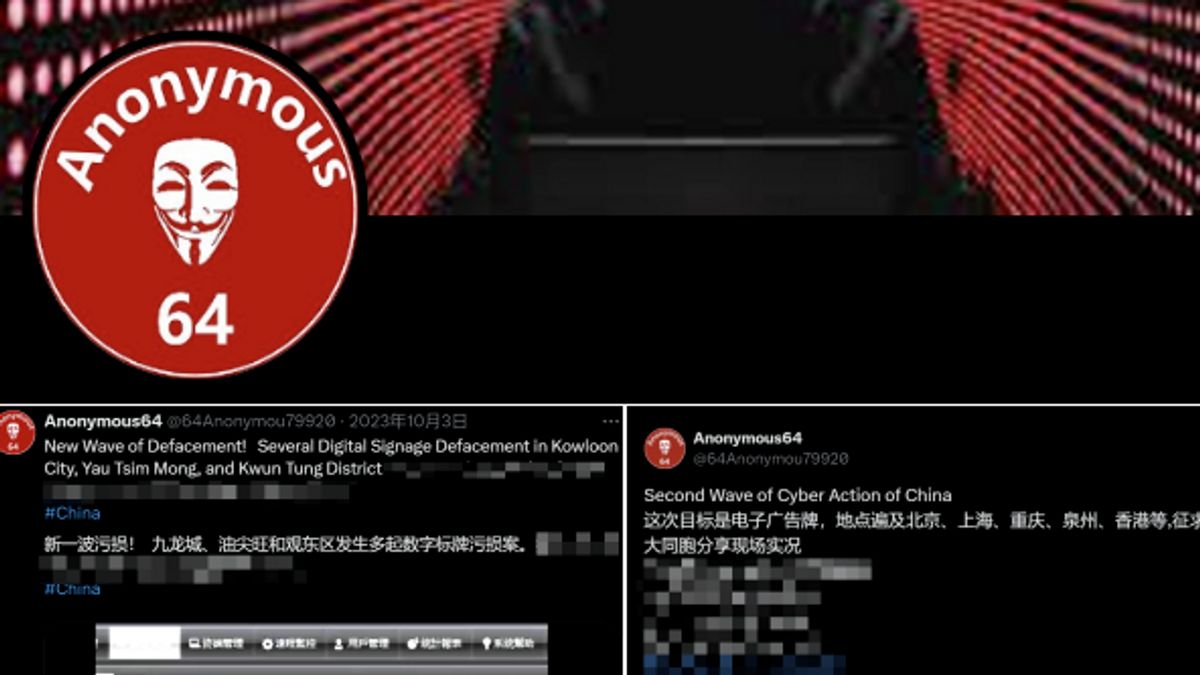China's Ministry of National Security on Monday, September 23, accused a group of hackers backed by the Taiwanese military, called Anonymous 64, of carrying out a series of cyberattacks against various targets in China.
These allegations come amid growing tensions between Beijing and Taipei, particularly over the issue of Taiwan's sovereignty. China claims Taiwan as part of its territory, while Taiwan insists that it is a de facto-independent country.
In its official statement, China's Ministry of National Security accused Anonymous 64, said to be part of Taiwan's military cyber warfare unit, of spreading content that damages the image of China's political system and its main policies. The group is said to have targeted websites, outdoor screens, and network television channels across China.
"This group seeks to upload and broadcast content that demeans the mainland political system as well as key policies," the ministry wrote in a post on its official blog. The Chinese government also called on its citizens to be vigilant and immediately report all forms of "anti-propagandal sabotage."
However, Taiwan's Ministry of Defense immediately denied the allegations, stating that it was China that became the main disruptor through its cyberattack and military abuse against Taiwan. In a statement, the Taiwan Ministry of Defense's Information, Communication and Electronic Forces Command confirmed that China's accusations were not true.
"Currently, threats from enemies and cyberattacks are very serious," the statement said. "China's communist military and forces coordinating with it continue to use aircraft, ships, and cyberattacks to disrupt Taiwan and are the main causes of peace damage in the region."
Taiwan has consistently rejected Beijing's claim to sovereignty, insisting that its government is legitimate and democratically elected. The island also often accuses Chinese groups of spreading disinformation or carrying out cyber attacks on various institutions in Taiwan.
Hacking group Anonymous 64, which was newly formed in June 2023, claims to have successfully penetrated several important websites in China. Their official account on platform X (formerly Twitter) shows screenshots of their attempts to broadcast a video comparing Chinese President Xi Jinping with an emperor, as well as commemorating the second anniversary of protests against China's strict COVID-19 policy. They also recalled the 1989 Tiananmen Square demonstration through hacking.
One of the videos posted by the group shows a member of Anonymous 64 wearing a Guy Fawkes mask, which is famous for graphic novels and V for Vendetta films. The video criticized Xi Jinping's leadership and China's overall political system.
SEE ALSO:
Even so, it has not been independently confirmed whether this group actually carried out the cyberattack they claimed. China's Ministry of National Security also added that their investigation found that many of the websites claimed to have been hacked by Anonymous 64 were actually fake or had very few traffic. They also alleged that some of the images posted by the group had been manipulated using photoshops.
The ministry published screenshots of Anonymous 64's X account, but with text that has been widely censored. They also announced that they had opened cases against three members of Taiwan's cyber warfare unit.
"We urge netizens not to believe or spread rumors, and immediately report cyber attacks or anti-propaganda activities to national security authorities," China's Ministry of National Security wrote in its blog.
Meanwhile, tensions between China and Taiwan have continued to rise in the past five years. China has stepped up its political and military pressure on Taiwan, including through military exercises around Taiwanese waters and other provocative actions. Taiwan continues to prepare for all possibilities, including an increase in cyber threats that could impact regional stability.
The English, Chinese, Japanese, Arabic, and French versions are automatically generated by the AI. So there may still be inaccuracies in translating, please always see Indonesian as our main language. (system supported by DigitalSiber.id)


















